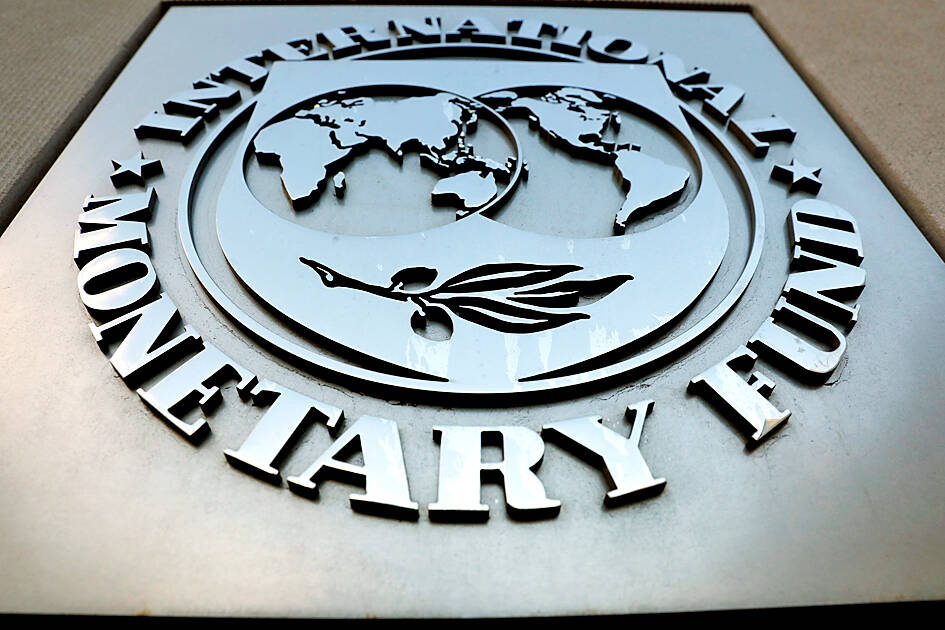Two US lawmakers on Thursday introduced a bill calling on Washington to support Taiwan’s participation as a member of the IMF to ensure its voice is heard on international financial issues.
The “Taiwan non-discrimination act” — introduced by US Representative Young Kim, who is on the US House Financial Services and Foreign Affairs committees, and US Representative Al Green — seeks to ensure that the US representative on the IMF board of governors advocates for Taiwan’s admission in the international financial institution.
The bill also calls for Taiwan’s participation in the organization’s regular surveillance activities relating to Taiwan’s economic and financial policies, job opportunities for Taiwanese at the IMF, and a provision for IMF technical assistance and training for Taiwan.

Photo: Reuters
“As the 21st-largest economy in the world and the 10th-largest goods trading partner of the United States, Taiwan deserves a seat at the IMF,” Kim said in a statement released on Thursday.
“For far too long, Taiwan’s freedoms have been suppressed and voice has been silenced by the Chinese Communist Party. The Taiwan non-discrimination act helps right this wrong and ensures Taiwan’s voice is heard in international financial decisions,” she said.
Kim said that she and Green would fight to pass the bill.
“I will always be a loud voice in Congress for our freedom-loving allies,” she added.
Green said in the statement that the bill requires the US’ IMF representative to use the voice and vote of the US to urge Taiwan’s participation and membership in the IMF.
“As a leading world economy, Taiwan’s experience in promoting sound economic policies can be instrumental in helping the IMF achieve its mission. Thus, it deserves a seat at the table,” he said.
“My hope is that this bill will help steer it toward that direction,” he said.
A bill to promote Taiwan’s membership in the IMF was previously introduced in May 2020 by then-US representative Anthony Gonzalez, who did not run for re-election last year.
In November last year, Gonzalez and Green again presented a bill with the same goal, but it failed to pass the House.
The IMF is a global organization of 190 members that promotes the health of the world economy.

CHAOS: Iranians took to the streets playing celebratory music after reports of Khamenei’s death on Saturday, while mourners also gathered in Tehran yesterday Iranian Supreme Leader Ayatollah Ali Khamenei was killed in a major attack on Iran launched by Israel and the US, throwing the future of the Islamic republic into doubt and raising the risk of regional instability. Iranian state television and the state-run IRNA news agency announced the 86-year-old’s death early yesterday. US President Donald Trump said it gave Iranians their “greatest chance” to “take back” their country. The announcements came after a joint US and Israeli aerial bombardment that targeted Iranian military and governmental sites. Trump said the “heavy and pinpoint bombing” would continue through the week or as long

TRUST: The KMT said it respected the US’ timing and considerations, and hoped it would continue to honor its commitments to helping Taiwan bolster its defenses and deterrence US President Donald Trump is delaying a multibillion-dollar arms sale to Taiwan to ensure his visit to Beijing is successful, a New York Times report said. The weapons sales package has stalled in the US Department of State, the report said, citing US officials it did not identify. The White House has told agencies not to push forward ahead of Trump’s meeting with Chinese President Xi Jinping (習近平), it said. The two last month held a phone call to discuss trade and geopolitical flashpoints ahead of the summit. Xi raised the Taiwan issue and urged the US to handle arms sales to

State-run CPC Corp, Taiwan (CPC, 台灣中油) yesterday said that it had confirmed on Saturday night with its liquefied natural gas (LNG) and crude oil suppliers that shipments are proceeding as scheduled and that domestic supplies remain unaffected. The CPC yesterday announced the gasoline and diesel prices will rise by NT$0.2 and NT$0.4 per liter, respectively, starting Monday, citing Middle East tensions and blizzards in the eastern United States. CPC also iterated it has been reducing the proportion of crude oil imports from the Middle East and diversifying its supply sources in the past few years in response to geopolitical risks, expanding

An Emirates flight from Dubai arrived at Taiwan Taoyuan International Airport yesterday afternoon, the first service of the airline since the US and Israel launched strikes against Iran on Saturday. Flight EK366 took off from the United Arab Emirates (UAE) at 3:51am yesterday and landed at 4:02pm before taxiing to the airport’s D6 gate at Terminal 2 at 4:08pm, data from the airport and FlightAware, a global flight tracking site, showed. Of the 501 passengers on the flight, 275 were Taiwanese, including 96 group tour travelers, the data showed. Tourism Administration Deputy Director-General Huang He-ting (黃荷婷) greeted Taiwanese passengers at the airport and